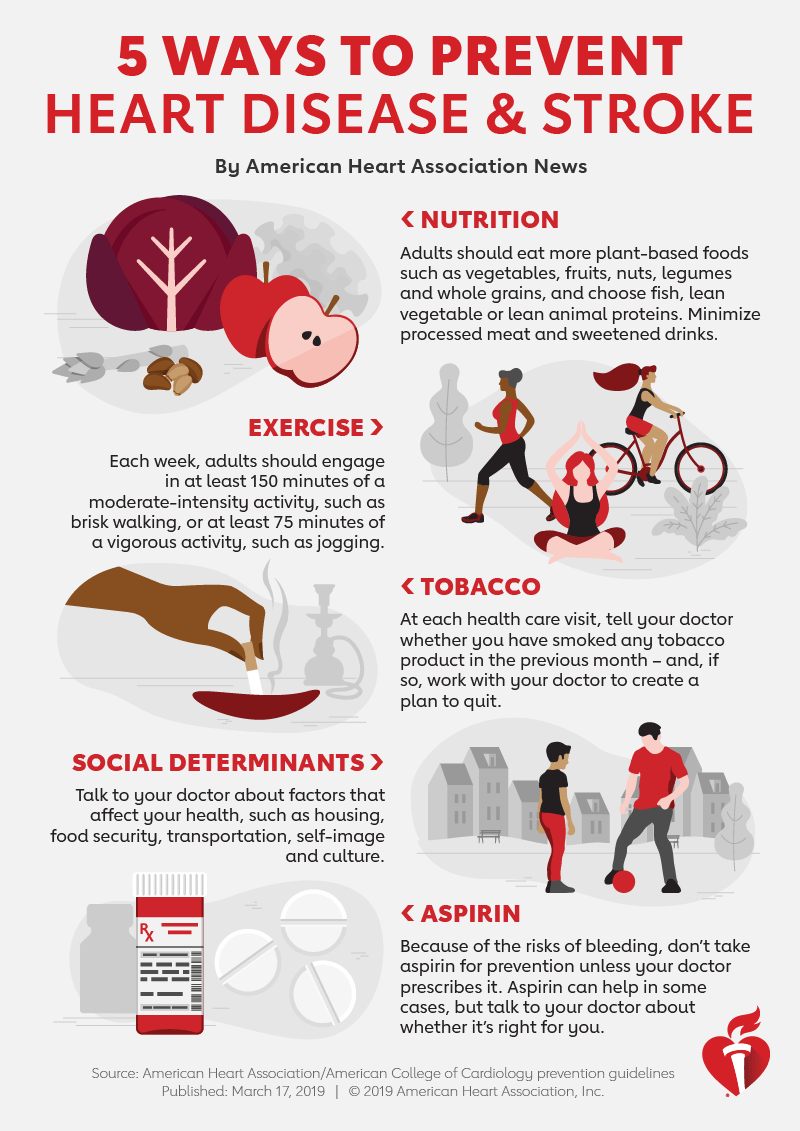New guidelines: Healthy lifestyle, managing risks are key to preventing heart attack, stroke
By Lucy Soto, American Heart Association News

Living a healthy lifestyle by getting plenty of exercise and eating a nutritious diet are the keys to preventing heart disease, according to new guidelines released Sunday.
The guidelines from the American Heart Association and the American College of Cardiology were presented Sunday at an ACC annual meeting and led by a group of the country's leading doctors and scientists. They put under one umbrella an array of research-based recommendations for doctors to use in counseling patients.
Heart disease and stroke are the leading causes of death, responsible for an estimated 17 million deaths every year worldwide. In the United States, cardiovascular disease is listed as the underlying cause in 840,678 deaths – about 1 out of every 3, according to the latest AHA statistics.
"The intent is to pull together all areas for primary prevention into one single file, a kind of one-stop shop for prevention," said Donna Arnett, co-chair of the 18-person writing committee. "One of the unique additions in this guideline is that we approached it from the patient's perspective.
"For example, if clinicians are thinking about how to advise a patient on how to eat a healthy diet, they should consider that there may be cultural factors or economic factors at play. We encourage fresh fruits and vegetables, but for some patients with food security issues, they may not always be affordable or accessible," said Arnett, dean of the University of Kentucky College of Public Health and a professor in the department of epidemiology. "We want to understand and meet patients where they are; it's a fundamental focus of this guideline."
 View text version of infographic.
View text version of infographic.
The guidelines encourage doctors to ask their patients plenty of questions to understand the impact that "social determinants of health" are having on their health.
Social determinants include numerous societal and environmental "barriers" – such as access to healthy food, safe places to exercise and quality care – that affect health and health care. Determinants also can include factors such as quality of sleep, stress and even cultural or societal perceptions about body size and image.
The expert panel made sure to emphasize the social determinants, giving specific examples in the guidelines, said Dr. Joseph Yeboah, who also was on the writing committee.
"We see it all the time as health care providers. There are a lot of barriers," said Yeboah, an associate professor of cardiology at Wake Forest School of Medicine in North Carolina.
"We all come from different backgrounds and perceive disease differently," said Yeboah, who was born and grew up in the west African country of Ghana. "In some cultures, disease is something that hurts, and if it doesn't then it's not disease.
"When you have high blood pressure, for example, it doesn't hurt. So, you have to let (patients) know there are consequences to high blood pressure," he said. "It's up to health care providers to address that barrier first so that the person will accept the treatment plan. The treatment plan should start with minimizing salt intake, exercising, weight loss and, if needed, medications."
For adults older than 40, the guidelines reiterate recommendations that doctors use a risk calculator to help estimate a patient's chance of developing cardiovascular disease within the next 10 years – and that doctors then have a "client-patient risk discussion" before starting a patient on medicines.
A few key pieces in the guidelines – which encompass separate recommendations on cholesterol and high blood pressure, as well as tackling obesity and diabetes – are new. For instance, the guidelines recommend doctors:
- Should not prescribe aspirin therapy for prevention because of the risk of bleeding, except in carefully selected patients.
- Should discuss tobacco use and exposure to secondhand smoke at each visit, and then help patients build a plan to quit smoking or reduce exposure to secondhand smoke.
In the area about healthy eating, experts included recommendations for diets that include more plant-based foods such as vegetables, fruits, nuts and whole grains, and those that feature fish, lean vegetable or lean animal proteins. The guidelines also urge doctors to counsel patients to minimize trans fats, processed meat, refined carbohydrates and sweetened drinks.
The guidelines point out that adults who are "habitually high consumers of sugar-sweetened beverages" could find low-calorie sweeteners a useful replacement strategy on the path to transitioning to water.
Related to exercise, the guidelines include recommendations, based on recent federal government guidelines, that adults should engage in at least 150 minutes a week of moderate-intensity physical activity or 75 minutes a week at a vigorous pace.
Yeboah said the emphasis on having doctors counsel their patients about healthy living shows an important shift. "We go right to behavioral and lifestyle changes first to minimize cardiovascular disease risk, before adding medication."
Although the guidelines corral together many individual areas related to preventing cardiovascular disease, Arnett said the overarching theme is rather simple.
"Healthy living, with diet and exercise," she said, "is the primary line of defense in preventing heart disease."
If you have questions or comments about this story, please email [email protected].
- Commentary from nutrition expert Penny Kris-Etherton: What you need to know about the new prevention guidelines




